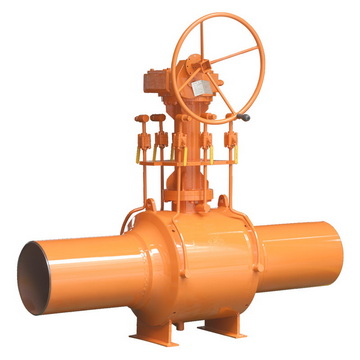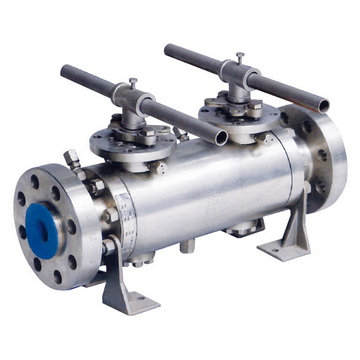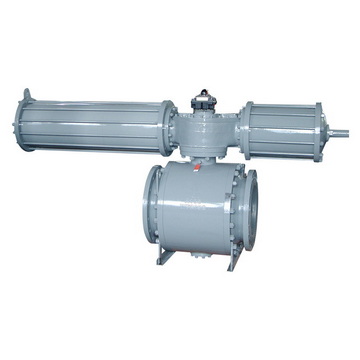Top Fully Welded Ball Valve Manufacturers and Suppliers in Europe
Content Menu
● What Are Fully Welded Ball Valves?
● Leading Fully Welded Ball Valve Manufacturers in Europe
>> Barthel Armaturen (Germany)
>> Valves Only Europe (Netherlands)
● Key Features and Advantages of Fully Welded Ball Valves
● Applications Across Industries
● Manufacturing Processes and Quality Assurance
● Frequently Asked Questions (FAQ)
>> 1. What distinguishes fully welded ball valves from flanged or bolted valves?
>> 2. Can fully welded ball valves be customized for specific industrial needs?
>> 3. What industries benefit most from fully welded ball valves?
>> 4. Are fully welded ball valves suitable for subsea applications?
>> 5. How does OEM service support benefit valve buyers?
In the industrial valve market, fully welded ball valves stand out for their robust design, reliability, and suitability for harsh environments such as oil and gas, petrochemical, and offshore industries. Europe hosts some leading Fully Welded Ball Valve manufacturers and suppliers known for producing high-quality fully welded ball valves that meet rigorous international standards. These companies provide diverse valve solutions including floating and trunnion-mounted ball valves, serving global customers with OEM services, customized designs, and advanced manufacturing technologies.

What Are Fully Welded Ball Valves?
Fully welded ball valves are valves where the body elements are welded together without bolts or flanges, forming a permanent, hermetically sealed unit. This design enhances durability and reliability, reducing leak risks and maintenance, especially under high pressure and corrosive environments. They offer excellent tight shut-off performance, making them ideal for critical pipelines and process systems. Fully welded valves typically support applications in oil & gas upstream to downstream processing, offshore drilling platforms, and seawater desalination plants.
The welding process used in these valves is critical, often involving full penetration welds with non-destructive testing techniques such as radiographic or ultrasonic inspection to ensure integrity. By eliminating mechanical joints, fully welded ball valves provide superior resistance to vibration and pressure surges common in industrial systems.
Leading Fully Welded Ball Valve Manufacturers in Europe
Europe has a cluster of expert manufacturers who excel in developing fully welded ball valves. These companies not only focus on high-quality materials and precise fabrication but also consistently innovate in valve design and performance to meet evolving industrial demands.
Barthel Armaturen (Germany)
Founded in 1985, Barthel Armaturen produces a wide range of industrial valves with a strong focus on ball valves designed for extreme conditions in oil, chemical, and water treatment industries. Their fully welded ball valves are engineered using advanced precision manufacturing and undergo rigorous testing to meet global quality standards. Barthel is known for providing both mass-produced standard valves and custom-engineered solutions tailored to end-user requirements. The company emphasizes sustainability and technological innovation in its product development.
Barthel's capabilities include automated welding technology and in-house testing facilities that ensure performance under extreme temperature and pressure conditions. Their valves accommodate various end connections, including butt weld, socket weld, and flanged, complementing their fully welded body design.
BAC Valves (Germany)
Since 1995, BAC Valves has been a reputed name in the European valve market, specializing in high-performance ball valves. Their fully welded ball valves are built for high-pressure and corrosive media applications, suitable for power generation, chemical processing, and water systems. BAC Valves prioritize precision engineering, in-house manufacturing, and strong customer support including installation and maintenance guidance.
BAC Valves integrates smart manufacturing techniques such as CNC machining and robotic welding, contributing to dimensional accuracy and superior joint strength in their fully welded ball valve line. Their R&D team actively collaborates with industrial clients to optimize valve designs for longevity and ease of operation.
Böhmer GmbH (Germany)
Established in 1956, Böhmer focuses exclusively on ball valves including fully welded types. Their product range covers sizes from 1/8" to 56" and pressures up to 500 bar, suitable for oil & gas, petrochemicals, and district heating networks. Böhmer's ball valves are prized for long-term operational safety and are utilized in above-ground, underground, and subsea pipelines worldwide.
Böhmer applies strict material selection standards, often using heat-treated stainless steel alloys for enhanced corrosion resistance and mechanical strength. Their manufacturing process is complemented by rigorous inspection protocols to guarantee zero leakages and maintain flow control accuracy in critical systems.
NTGD Valve (Germany)
NTGD Valve has built a strong presence since 1997 by supplying valves for demanding industries such as oil and gas and petrochemicals. Their fully welded ball valves combine durability with the ability to function in high-temperature, high-pressure environments. They also provide tailored valve sizes and configurations to suit exact client needs with strict quality inspections.
NTGD Valve's design engineers utilize finite element analysis (FEA) tools to simulate stress and thermal effects, optimizing the welded ball valve structures before production. Their fully welded valves accommodate special trims and sealing arrangements to handle abrasive or toxic fluids safely.
Valves Only Europe (Netherlands)
A newer entrant since 2008, Valves Only Europe focuses on innovative valve solutions including fully welded ball valves. Their modular and lightweight designs cater to sectors requiring high reliability with easier installation and maintenance, supported by European certification standards.
Valves Only Europe uses advanced alloys and cutting-edge welding methods that reduce valve weight without compromising strength. Their modular approach allows customers to select specific valve components pre-assembled in a fully welded body, expediting delivery times while ensuring optimal functionality.
Key Features and Advantages of Fully Welded Ball Valves
Fully welded ball valves offer numerous advantages making them preferred choices for challenging industrial environments:
- Leak-proof construction: The welded body eliminates flange or bolt failures, ensuring zero leaks even under severe conditions. This leak-tightness is essential in handling hazardous fluids to minimize environmental impact and safety risks.
- Robustness: Able to withstand extreme pressures (up to 500 bar) and high temperatures, as well as corrosive media such as seawater and hydrocarbons. Their solid welded structure resists gasket degradation and mechanical loosening.
- Low maintenance: No gasket replacements or bolt tightening needed, lowering downtime and operational costs. The hermetic seal extends maintenance intervals significantly.
- OEM capability: Many European manufacturers provide OEM services, producing valves compliant with global standards like API 6D, ISO, ASME, and PED. This ensures valves integrate smoothly into diverse industrial systems worldwide.
- Customized designs: Tailoring valve size, material (WCB, CF8M, duplex stainless steel, Inconel, etc.), and connection types to meet diverse industrial requirements. Custom seats, stem seals, and actuators are available to optimize valve performance.
- Extended lifespan: Particularly suitable for oil and gas upstream, downstream, offshore platforms, and seawater desalination applications, offering reliable operation over decades.
- Environmentally friendly: The reduction in leak points and longer lifecycle contributes to sustainability goals by minimizing waste and pollution.
- Enhanced safety: Fully welded designs reduce risks of catastrophic failures, vital in hazardous chemical or hydrocarbon environments.

Applications Across Industries
Fully welded ball valves have wide-ranging applications due to their durable and leak-proof design:
- Oil & Gas: They serve critical roles in pipeline isolation, control in offshore drilling platforms, subsea installations, and downstream refinery operations. Their ability to handle high-pressure hydrocarbons and abrasive slurries is essential in this sector.
- Petrochemicals: Handling reactive or corrosive fluids safely requires valves with superior material integrity and zero leakage — roles perfectly suited for fully welded ball valves.
- Water treatment & desalination: Managing brine and seawater pipelines through corrosion-resistant valve bodies helps maintain plant efficiency and protects infrastructure from harsh marine environments.
- Power generation: Steam and water process lines in thermal power stations demand valves that can endure high temperatures and pressure cycling, making fully welded ball valves a reliable asset.
- Chemical processing: Secure handling of hazardous chemicals calls for valves with exceptional sealing performance, chemical resistance, and safety certifications.
- District heating and cooling: Distributed energy systems rely on welded ball valves to control flow with minimal leakage over extensive network pipelines.
- Marine and offshore platforms: Their welded construction withstands saltwater corrosion, vibration, and pressure variations found in subsea environments.
Manufacturing Processes and Quality Assurance
The production of fully welded ball valves involves stringent manufacturing and testing protocols:
1. Material selection: Use of high-grade steels and alloys ensures corrosion resistance and mechanical robustness.
2. Precision machining: CNC machining offers tight tolerances for components such as ball, seat, and stem.
3. Welding: Fully welded bodies require skilled welding techniques such as TIG or orbital welding to guarantee full penetration without defects.
4. Non-destructive testing: Radiographic, ultrasonic, and dye penetrant inspections detect internal and surface flaws in welds.
5. Pressure testing: Hydrostatic and gas tests verify the valve's ability to withstand specified pressure classes without leakage.
6. Performance validation: Functional tests including torque measurement and cycle endurance ensure operational reliability.
7. Certification: Compliance with international standards like ISO 9001, API 6D, PED, and ATEX is mandatory for valves entering regulated markets.
Robust production controls and continuous improvement measures help European manufacturers sustain their reputation for quality and reliability.
Innovations and Trends
European manufacturers continuously innovate in fully welded ball valve technology to meet future market demands:
- Adoption of new corrosion-resistant materials such as duplex and super duplex stainless steels improves lifespan in harsh environments.
- Advanced coatings and surface treatments reduce wear and friction within valve components.
- Integration of smart actuators and IoT sensors enables remote monitoring of valve status, predictive maintenance, and enhanced process automation.
- Lightweight designs facilitate easier handling and installation in offshore and subsea projects.
- Environmental regulations push development towards valves with zero emission certifications, reducing fugitive emissions during operation.
- Modular designs shorten lead times by allowing standard production with customizable end connections and trims.
These developments ensure that European fully welded ball valves remain at the forefront of industrial valve technology globally.
Conclusion
European fully welded ball valve manufacturers represent the pinnacle of valve technology, combining decades of expertise, advanced production methods, and a commitment to quality. Their valve products—suitable especially for challenging industrial sectors like oil and gas—offer unmatched reliability, safety, and longevity. The welded design eliminates leak risks and lowers maintenance costs, proving advantageous in environments that demand tight shut-off under extreme conditions. Their OEM and customized production capabilities enable global businesses to deploy dependable valves that enhance operational efficiency and comply with stringent international standards. For industries requiring robust and leak-proof piping solutions, fully welded ball valves from Europe remain an excellent choice, delivering both technical excellence and peace of mind.

Frequently Asked Questions (FAQ)
1. What distinguishes fully welded ball valves from flanged or bolted valves?
Fully welded ball valves have permanently welded body parts, eliminating bolts and flanges, which reduces leak points and increases strength for high-pressure applications. This design provides superior durability, especially in harsh environments.
2. Can fully welded ball valves be customized for specific industrial needs?
Yes, manufacturers often offer customization in size, materials, pressure ratings, and configurations to match unique process requirements. Custom seats, seals, and end connections can be tailored accordingly.
3. What industries benefit most from fully welded ball valves?
Oil and gas, petrochemical, seawater desalination, power generation, and chemical processing industries widely use these valves due to their durability, leak-proof performance, and suitability for high-pressure environments.
4. Are fully welded ball valves suitable for subsea applications?
Yes, many European manufacturers produce fully welded ball valves rated for subsea use, able to resist corrosive environments and high pressures typical of underwater pipelines.
5. How does OEM service support benefit valve buyers?
OEM services allow buyers to receive valves built to their exact specifications, ensuring quality assurance and compliance with international standards. This guarantees reliable system integration and long-term operational safety.
Hot tags: Top Fully Welded Ball Valve Manufacturers Europe, Fully Welded Ball Valve Suppliers Europe, Best Fully Welded Ball Valve Companies Europe, High Pressure Fully Welded Ball Valves Europe, Industrial Fully Welded Ball Valve Europe, OEM Fully Welded Ball Valve Manufacturers Europe, Fully Welded Ball Valve Exporters Europe, Custom Fully Welded Ball Valves Europe, European Fully Welded Ball Valve Factory, Reliable Fully Welded Ball Valve Brands Europe